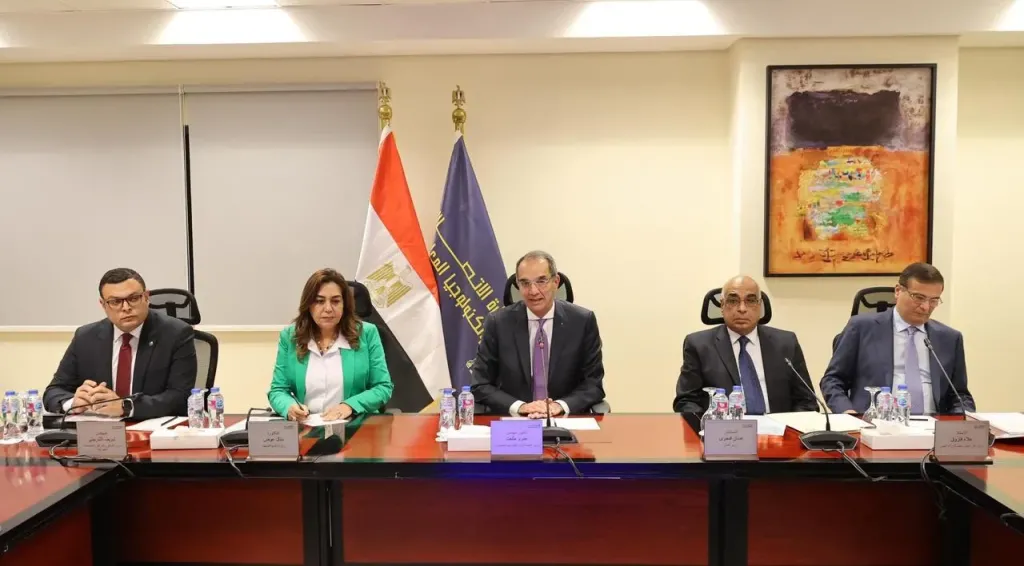Ministers of ICT, Local Development, Justice, Housing, Agriculture Discuss National Real Estate ID Project, Law Executive Regulations

Minister of Communications and Information Technology Amr Talaat, Minister of Local Development Manal Awad, Minister of Justice Adnan El-Fangary, Minister of Housing, Utilities and Urban Communities Sherif El-Sherbiny, and Minister of Agriculture and Land Reclamation Alaa Farouk have held a meeting at the Ministry of Communications and Information Technology (MCIT) headquarters in the New Administrative Capital to review the current status of the national real estate identification system. Representatives from several relevant ministries and the Administrative Control Authority (ACA) attended the meeting.
The meeting aimed to coordinate efforts in preparing the executive regulations for the National Real Estate ID Law, following its recent approval by the House of Representatives. It also reviewed progress in developing the digital system designated to manage the identification numbers assigned to real estate units in different governorates, in preparation for its upcoming launch. The National Real Estate ID Law marks a significant milestone in the regulation of real estate assets at the national level.
During the meeting, the ICT Minister stressed that the strategic objective of implementing the national real estate ID system is to assign a unique identifier to each property, making it the sole reference in all government interactions—similar to the National ID system used for citizens.
Talaat highlighted the efforts made during the preparation of the National Real Estate ID Law, including the integration of all relevant databases with the national real estate ID system. He noted that approximately 19 million national real estate identification numbers have been issued across several governorates, in coordination with the real estate property operations center at ACA. He also underscored the system’s role in providing accurate data and indicators for each property, whether residential units or agricultural land.
For her part, the Minister of Local Development affirmed her ministry’s commitment to cooperating with MCIT to facilitate the implementation of the national real estate identification system. She said the system would help unify and link databases and improve their quality to support its effective operation. Awad added that the Ministry of Local Development will provide the local administration with all necessary data related to local services delivered to citizens across governorates and through technology centers, contributing to the system’s successful implementation on the ground.
In his remarks, the Minister of Justice underlined the significance of the first and second phases of enforcing the National Real Estate ID Law and the regulations for identifying each property. He emphasized the importance of establishing dedicated units in each governorate within the national real estate identification system to ensure its effective operation.
The Minister of Housing emphasized the importance of unifying efforts within the system, including the creation of a database for all existing properties in Egypt, as well as future developments. He highlighted the system’s connection to the Egyptian Real Estate Platform (Egypt MLS), which was launched and activated in collaboration with MCIT. He also referred to the recently approved National Real Estate ID Law, which aims to assign a unique national identification number to every property across the country.
El-Sherbiny further noted that the project paves the way for comprehensive digital transformation in the management of real estate assets. He stated that the Ministry of Housing has taken concrete steps toward institutional activation by establishing two new units: the Egyptian real estate export unit, which aims to develop a national platform for marketing Egyptian real estate globally and connecting foreign investors with available opportunities in a transparent and structured manner; and the real estate market regulation unit, which will set regulatory frameworks and oversee the relationship between developers and buyers. He added that the meeting reflects the government’s steady progress toward building a unified digital system for managing its real estate assets.
The Minister of Agriculture and Land Reclamation highlighted the key role played by MCIT in implementing the real estate identification project as part of its efforts to develop the digital system, in coordination and close cooperation with relevant ministries and government entities. This, he noted, contributes to streamlining citizens’ interactions with various government bodies. Farouk also emphasized the importance of linking the national real estate ID to each housing unit—whether owned, rented, or inherited—as well as to agricultural land, especially in light of challenges posed by fragmented ownership and inheritance among heirs.
Assistant ICT Minister for Digital Transformation Mahmoud Badawi reviewed the mechanism adopted by MCIT to develop the national real estate identification system. The process begins with identifying the land, followed by the building, the unit, and finally the street. He noted that the mechanism follows international coding standards, with the identification number printed on electricity bills.
It is worth noting that the national real estate identification number is a system designed to assign a unique identifier to every real estate unit in Egypt—residential, commercial, or industrial—regardless of its type, size, or area. The system aims to eliminate address duplication, which has previously been exploited in unlawful practices such as address manipulation and fraud. Citizens will be able to identify the national real estate number of their residential or commercial units through their electricity bills. The system is also expected to enhance transparency, regulate the real estate market, and support Egypt’s digital transformation efforts.
https://tinyurl.com/4z6exrxj













